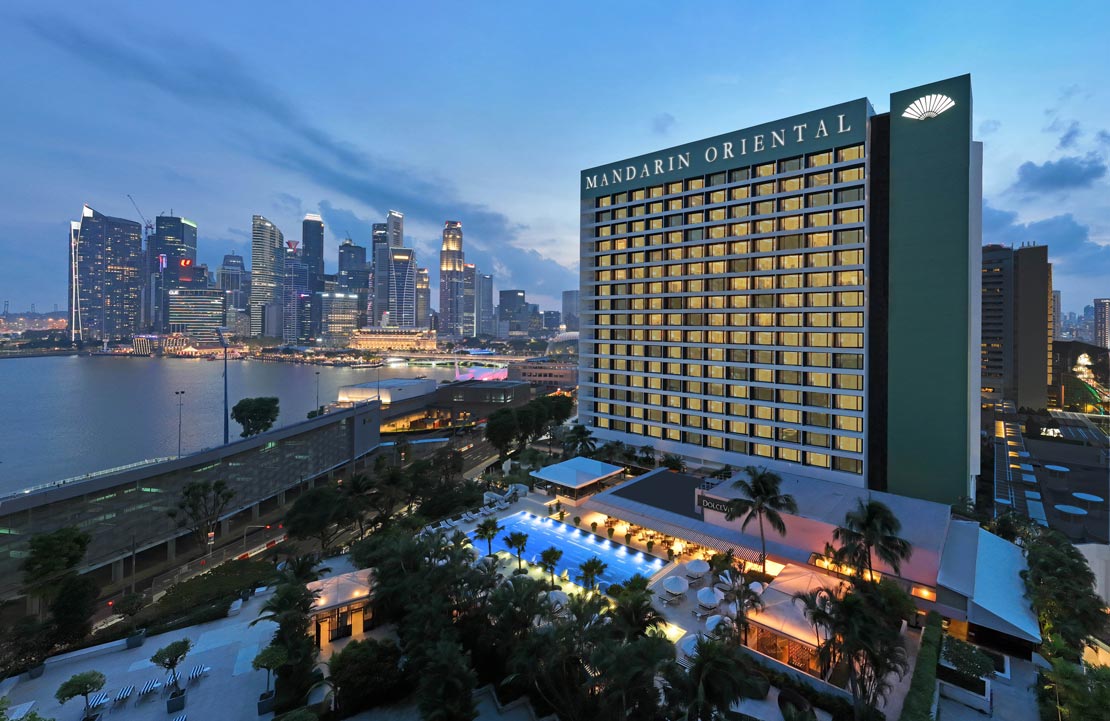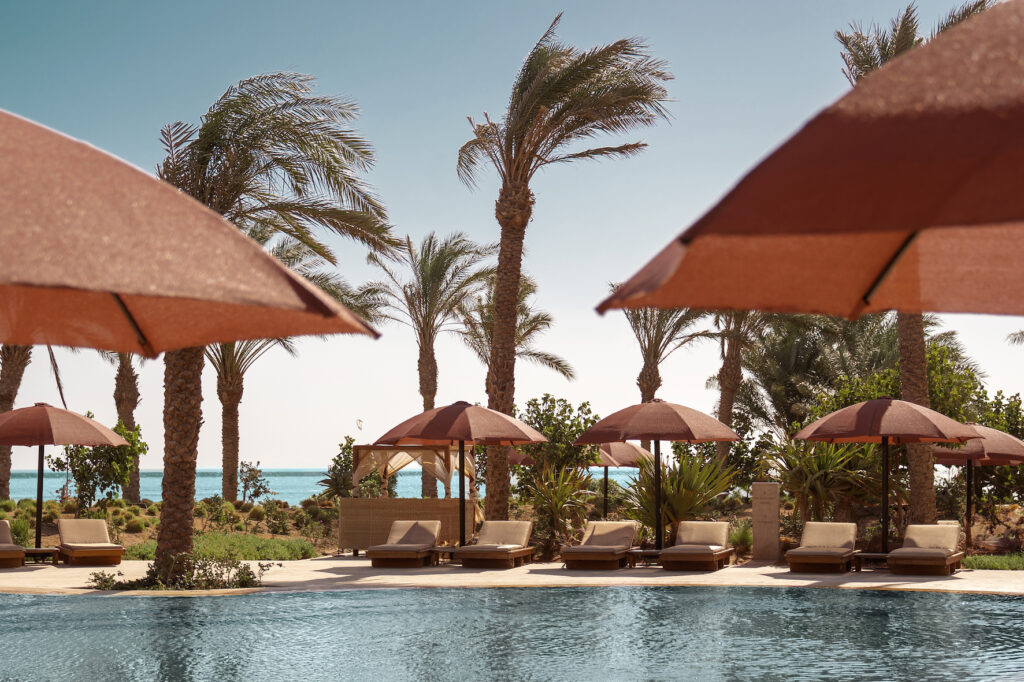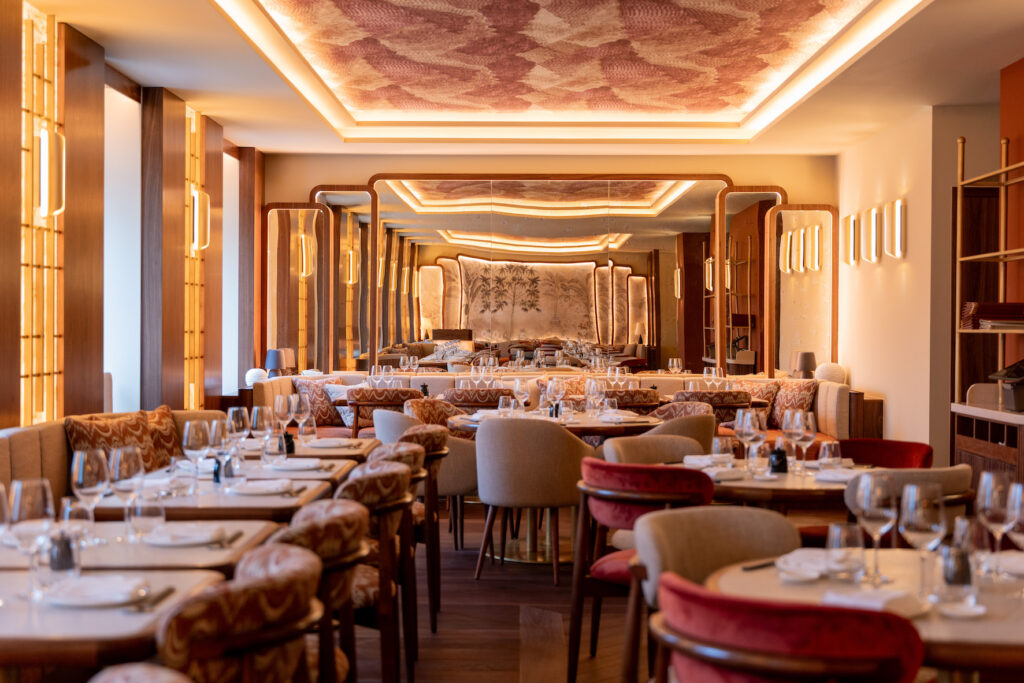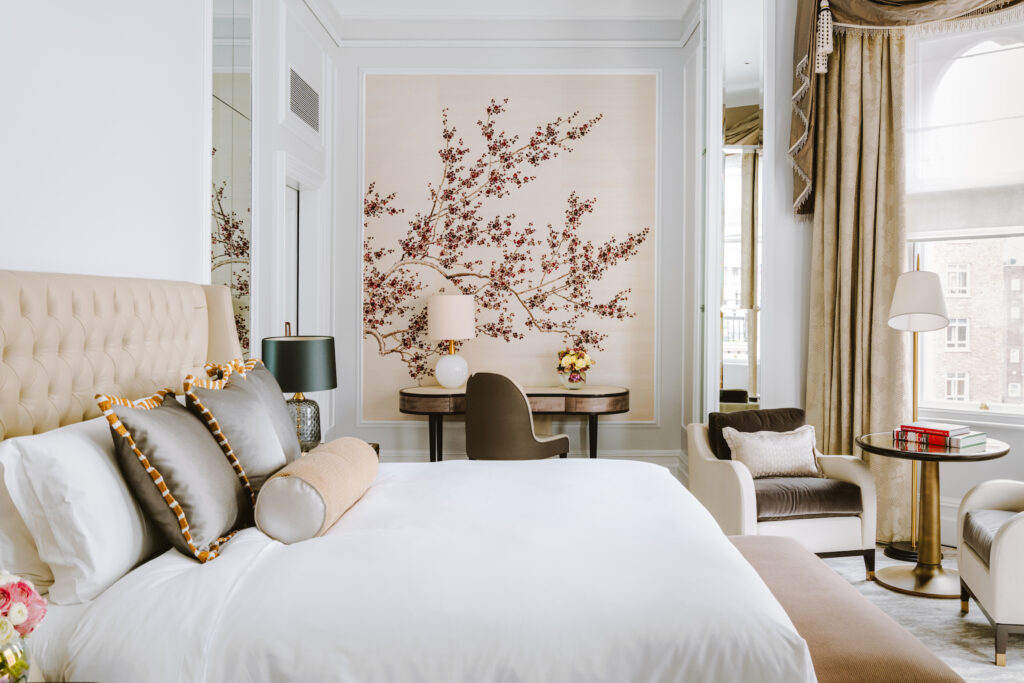Eyebrow-hiking views of Singapore’s Marina Bay—and the F1 track—are just one draw, following a top-to-toe renovation.
Welcome to Checking In, a review series in which our editors and contributors rate the best luxury hotels based on a rigorous—and occasionally tongue-in-cheek—10-point system: Each question answered “yes” gets one point. Will room service bring you caviar? Does your suite have its own butler? Does the bathroom have a bidet? Find out below.
Describe the hotel in three words: Luxe Cosmopolitanism, Distilled
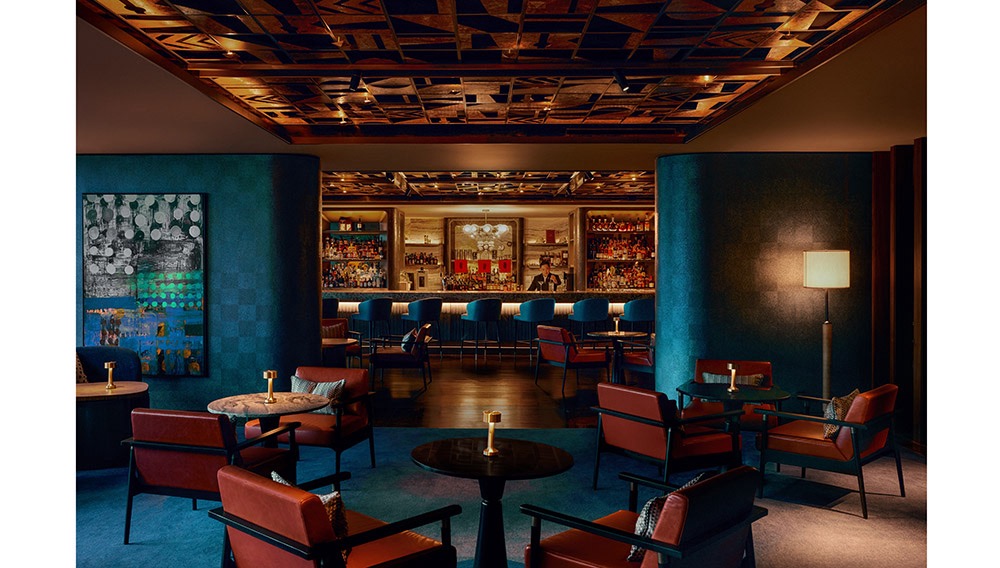
What’s the deal?
Originally designed by late American architect John Portman in 1987, the Mandarin Oriental Hotel Group’s Singapore outpost reopened in September following a six-month revamp by Kuala Lumpur-based firm DesignWilkes.
The idea was to encapsulate modern-day Singapore: it’s easy to forget, whilst visiting, that the city-state was a speck of mangrove and rainforest at the southern tip of Malaysia until Stamford Raffles, William Farquhar and their entourage arrived just over 200 years ago. It still gets dubbed “Asia-lite” by the expat denizens of Taipei, Bangkok and even the still Western-tinged Hong Kong: but eclectic, international charm is the whole point of modern Singapore, really, and has been embraced to the max by the Mandarin Oriental’s first ever design reboot.
Wandering around the lobby, visitors will encounter Peranakan (mixed Chinese and Malay/Indonesian heritage) architectural flourishes, nods to the black and white British colonial houses in surrounding neighbourhoods and, as well as an abundance of orchids(Singapore’s national flower) constantly refreshed by local florists. There’s also a giant mural, “Bloom”, created by Malaysian artist Red Hong Yi and composed of more than 10,000 flowers, behind the reception desk.
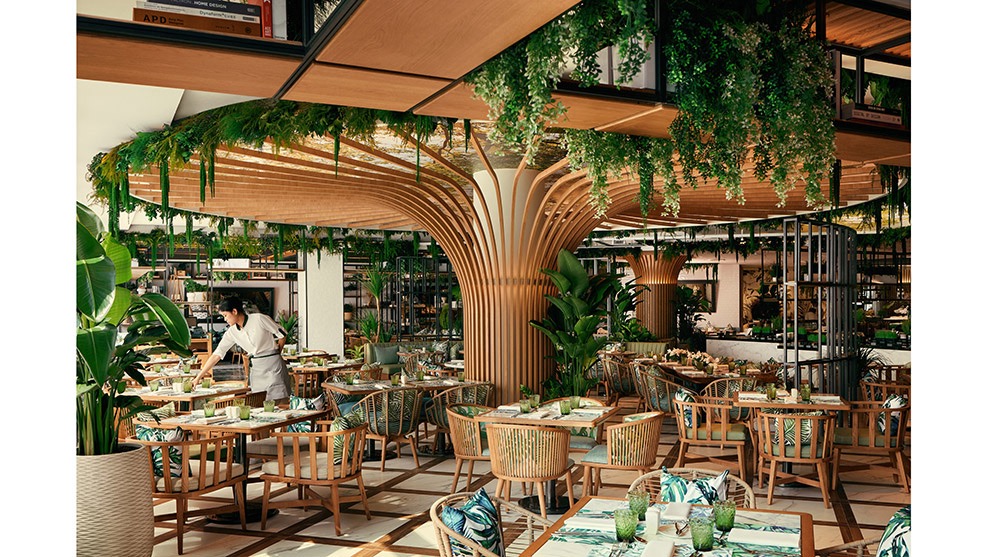
“Every corner of the hotel tells a story, from Singapore’s lush landscapes to the intricate details found in traditional shophouses,” as Principal Designer Jeffrey Wilkes puts it. “We wanted guests not just to be visiting the city, but to feel a part of it.”
Take the lift up a couple of floors, and prepare to be awestruck when looking upwards intothe vast atrium of the building, a giant beehive of tiered corridors lit up by floating-dandelion chandeliers. Switch your gaze downwards, and the sight of the circular, 120-cover Morton’s The Steakhouse – sitting rakishly in a corner, as if frisbeed gently there as an afterthought – will give you an abrupt sense of scale.
It’s no hyperbole to call this renovation one architectural masterstroke on top of another.
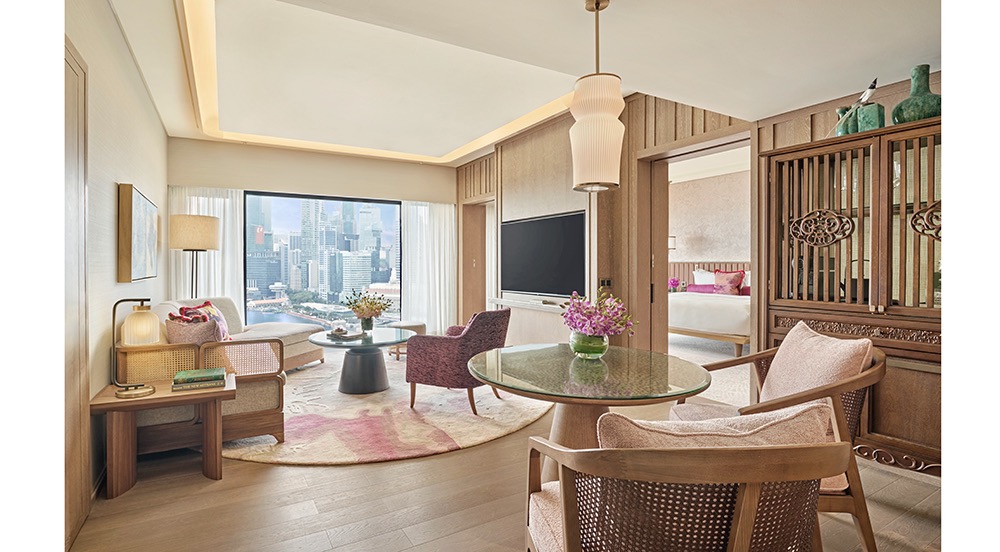
The Best Room
Singapore got itself a new iconic focal point when Marina Bay Sands opened in 2010 (a fourth tower is slated for completion in 2028), and a big priority with this revamp was to shift the suites’ aspects so that they look towards it. Hence, all 42 of them (there are 510 keys in all), as well as being generously proportioned and done out in therapeutic pink and purple hues (inspired by our by now old friend the orchid), boast floor-to-ceiling windowsand panoramic city views.
The Presidential Suite (around €10,000 per night) has a living area and dining room that cancomfortably accommodate eight guests, but the piece de resistance is the four-bedroom Royal Marina Bay Penthouse (around €16,000 per night): a 68sqm space graced withdappled batik patterns and magenta and brown flourishes whose private balcony overlooks what becomes, during the Singapore Formula 1, the track. The fact that completion of the renovations was targeted for a week before last year’s F1 tells you how sought after this is as a hospitality option when the Grand Prix hits town.
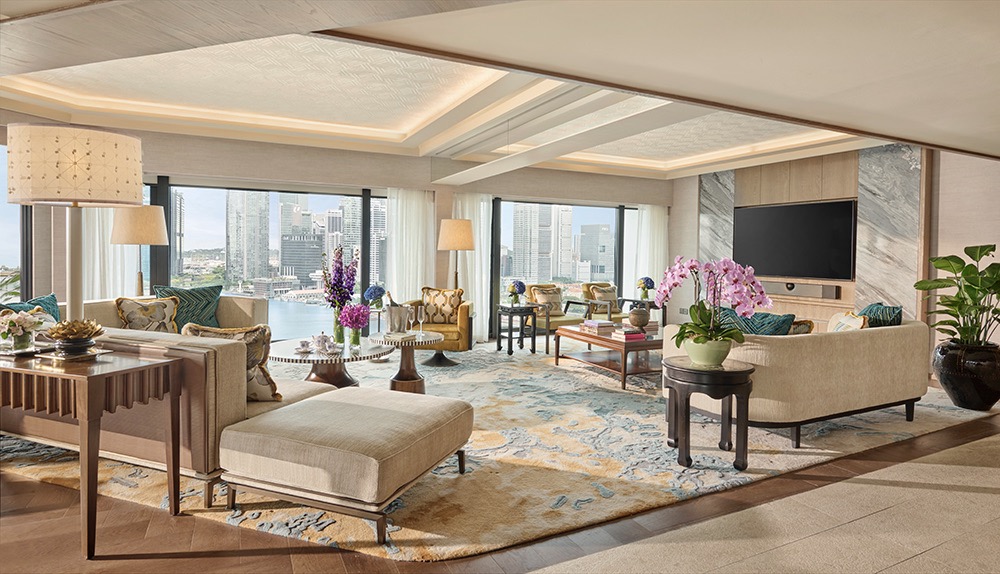
The Rundown
Did they greet you by name at check-in?
Yes – the warmth, both received and witnessed elsewhere, was overwhelming. We later learned that kids, on arrival, are given welcome packs containing stuffed versions of the city’s lion mascot.
Was a welcome drink ready and waiting when you arrived? (Bonus points if it wasn’t fruit juice)
Not of the alcoholic variety – but it was 8am, and a bracing bottle of Mandari Oriental-branded French Cabernet Sauvignon awaited in the room: part of a coffee-table welcome arrangement that also included the customary welcome letter and treats from The Mandarin Cake Shop downstairs.
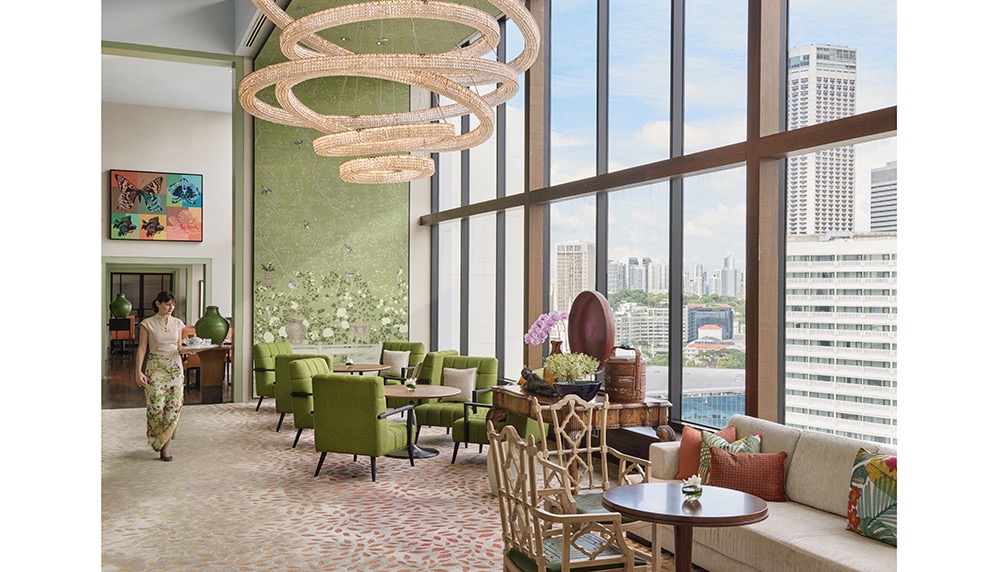
Is there a private butler for every room?
Guests of the suites and Marina Bay View rooms have access to Haus 65, a VIP arrangement whereby a team of MO Curators help organise experiences and attend to guests during their stay.
Is the sheet thread count higher than 300?
It’s 330 in the rooms, ramping up to 530 yarns per square inch in the suites, US linen makerQuivera here ensuring that the phrase “nice threads” isn’t confined to fashion. User-friendly black-out options are also conducive to a jet-lag-busting sleep, although you may feel inclined to leave the curtains open and wake up a view of either Marina Bay, the South China Sea or the city.
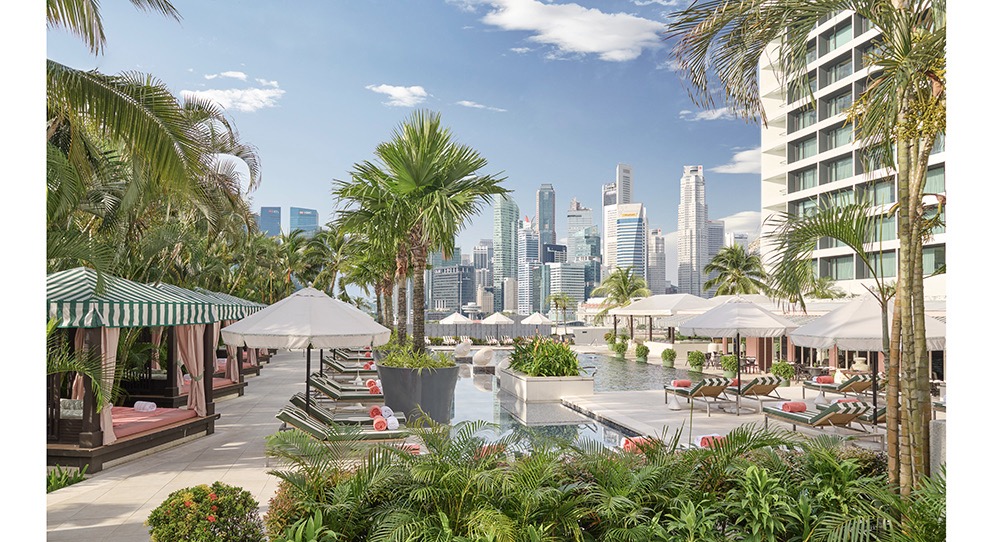
Is there a heated floor in the bathroom? What about a bidet?
Both are redundant here – the former made so by equatorial climes and humidity levels that frequently reach 100 percent; the latter by one of those toilets, increasingly common in five-star travel, with a sizable wall-mounted remote control.
Are the toiletries full-sized?
Yes. Suites, Seaview Rooms and Marina Bay View Rooms have potions and unguents from Barcelona brand Natura Bissé, while the Deluxe Rooms and Residential Suites use Diptyque toiletries.
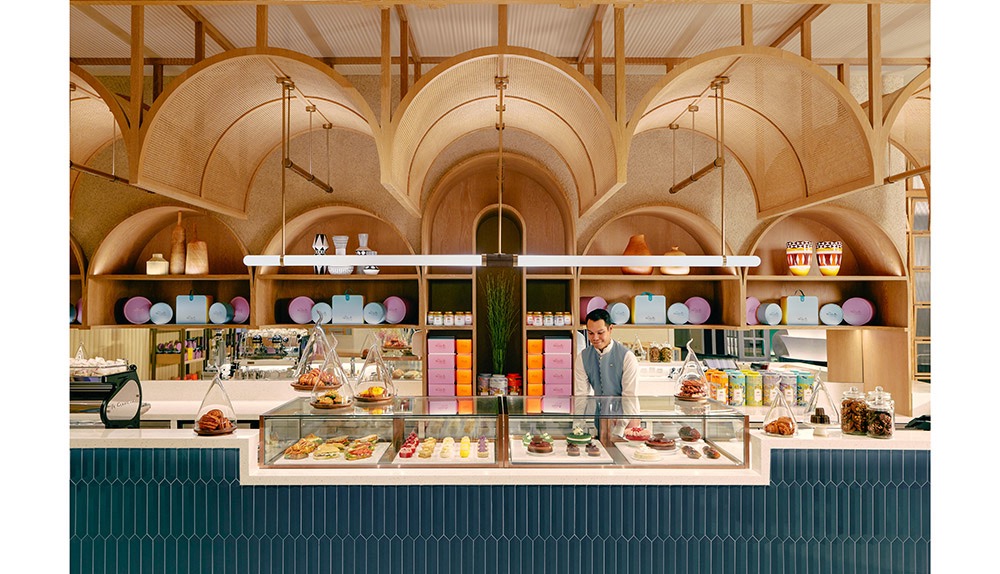
How are the spa and gym?
Natural wood finishes, mosaic tiles and cloud motifs are lit up subtly by the soft lighting and the lumens allowed in via lacquered shutters (unusually, instead of underground, the spa here is on the fifth floor, next to the pool) characterise the surrounds in a wellness zone whose USPs include a 62 sqm Couple’s Suite, showers that haver mist options and release aromatic scents and signature treatments such as the Oriental Harmony: a four-=hands affair involving a vigorous warm scrub prior to massage.
The gym is vast, evidently newly kitted out as part of the refurb and blissfully devoid of wall-shaking techno.
Do you want to spend Friday night in the lobby bar?
An abundance of velvet, leather and colonial furniture characterises the vibe in The MO Ba, whose cocktail menu is inspired by its surrounds – Reclaimed Slings, for example, being a fresh take on the Singapore Sling invented a stone’s throw away at Raffles, but made with cherry and pineapple. The White Rabbit, meanwhile, is inspired by the iconic Chinese confectionary, but with a citrusy, local twist.
If drinks are not pre-prandial, opt for laksa fries from the snack menu. So yes, even if Friday night stretches from early evening until the early hours, we do want to.
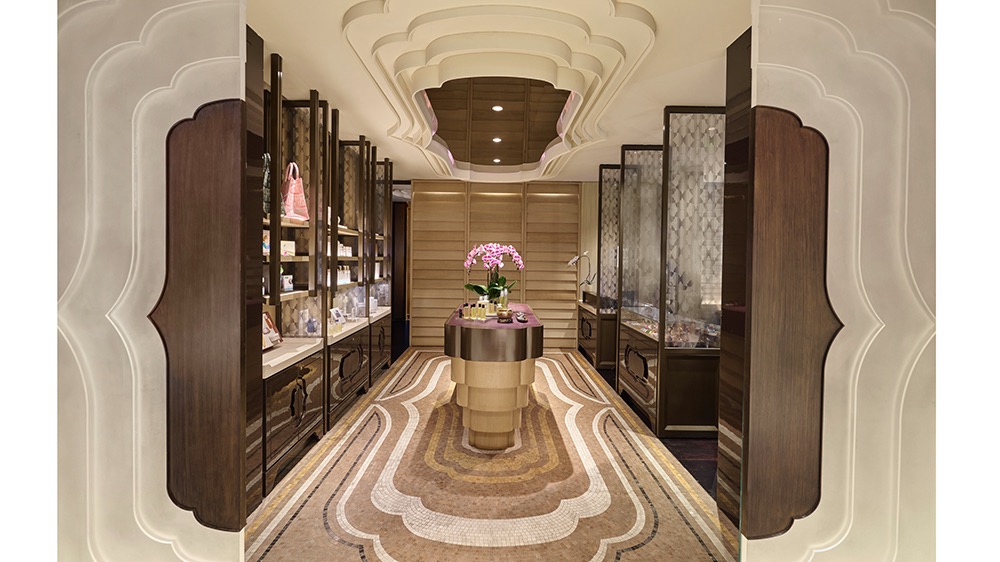
Does the resort have a standout perk or activity?
Along with Emmas Raducanu and Watson, according to the jovial gent whose team oversees the experience, we thoroughly recommend The Circuit Sidecar Adventure: an exploration of the hotel’s surrounds in the sidecar of a vintage Vespa. A popular destinationfor it is Kampong Glam, a colourful (both literally and figuratively speaking) district wherevintage clothing and Chinese craft antiques can be perused within the pleasantly ramshackle, multi-hued colonial shophouses.
Make sure your guide points out the giant murals, featuring life-size characters and wittyfalse perspectives, by Ip Yu Chong. An alterative route, the ‘Crazy Rich Asian’ experience,explores movie locations and a former 1800’s Pepper Plantation.
Insist, too, on a car taking you to Maison 21G in the Marina Bay Sands mall: this French establishment, with whom Mandarin Oriental has a partnership, has a perfumecustomisation programme which offers an incredible lesson in the olfactory arts, as well as a great take-home gift.
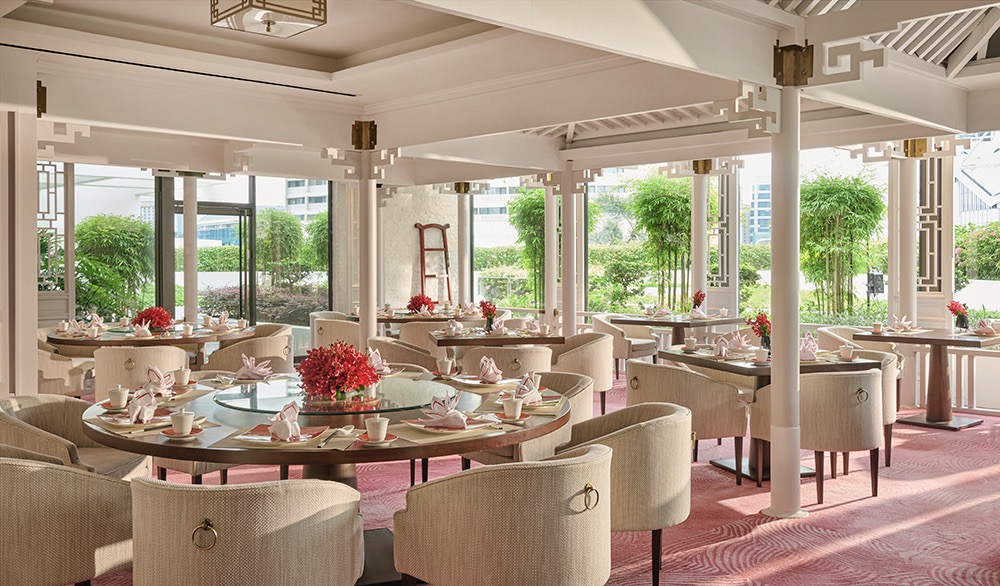
Any other USPs?
The 600sqm Oriental Ballroom, with its 20-metre-wide curved LED screen, would shame most alternatives for a global corporate congregation; the outdoor swimming pool has a better aspect over the Singapore skyline than its iconic neighbour, Marina Bay Sands, which you get to actually see rather than see from while sipping aperol spritzes between dips.
Then there’s the thoughtfully curated collaborations, both international (London foot guru Margaret Dabbs is behind the manicures and pedicures, French brand Biologique Recherche the spa’s facial treatments) and local: a temporary membership to the close-by Mandala Club means that you can rub shoulders to locally influential folk in the Lion City’s only members’ operation where locals and expats have an equal presence.
Mandala Club’s interior aesthetes are also behind the VIP Haus 65 club lounge within the hotel.
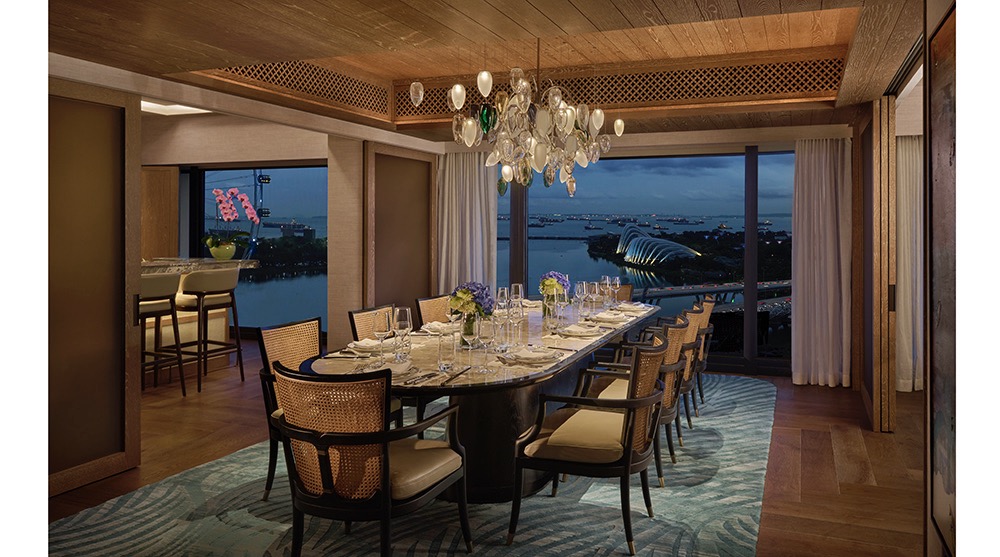
Is there caviar on the room service menu? If so, what kind?
Yes. Fifty grams of golden-brown roe from the Oscietra sturgeon is accompanied by a 2014Louis Roederer Cristal Millesime Brut Reims in the opening option on the in-room breakfast menu (which also includes fresh fruit, juices, eggs, smoked salmon, cold cuts, cheeses and freshly baked breads and pastries).
Elsewhere, an embarrassment of all-day dining options includes sashimi and sushi, European and South-East Asian and Indian fare at Embu, a restaurant space-cum-botanical garden whose louvred timber canopy and leaf motifs are a nod to the native tree the restaurant is named after; authentic modern dim sum and other Cantonese cuisine at Cherry Garden; flavours from all over Italy at Dolce Vita, where Tuscan chef de cuisine Niccolo Ferrazzani’s specialties include filetto (a slab of pan-roasted Wagyu beef tenderloin with red wine jus and mustard hollandaise); and immersive ‘Kappo’ (‘cut and to cook’ Japanese fine dining) at Zuicho.
Would you buy the hotel if you could?
I truly wonder what kind of offer the €4.5 billion (approx) group would accept? For now I’d settle happily for one of the 45 residential suites as a perfect bolthole, whether heading to the Lion City for the F1, for an Asia-Pacific stopover or simply to absorb the cosmopolitan charm of the most justifiably expensive city on the planet.

The Verdict
There’s nothing new about hotel chains avoiding ubiquity, and instead alloying signature brand design touches with localised interior flourishes and cultural references that make the hotel feel “in situ” – but Mandarin Oriental Hotel Group has taken the concept to the next level. If the world were to follow France’s lead and launch a distinction above “five-star”, this would surely be a contender.
Score: 9/10
What Our Score Means:
1-3: Fire your travel agent if they suggest you stay here.
4-6: Solid if you’re in a pinch—but only if you’re in a pinch.
7-8: Very good. We’d stay here again and recommend it without qualms.
9-10: Forget booking a week. When can we move in permanently?
Rates start at around €1,300 per night.

